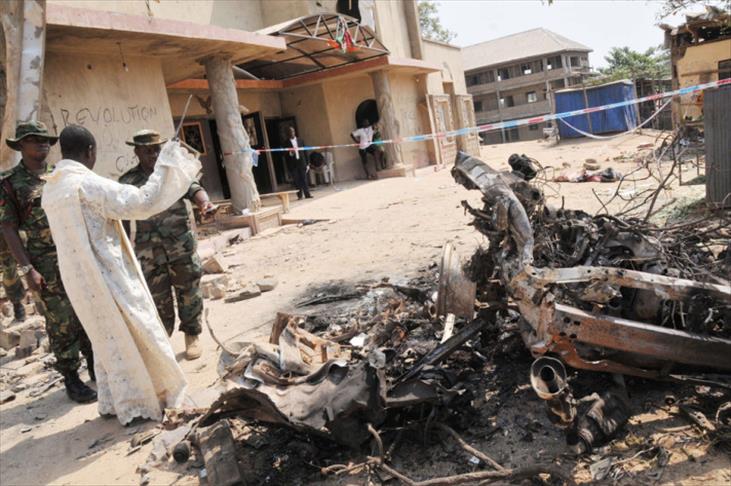
LAGOS - By Rafiu Ajakaye
The Nigerian army claimed late Monday that the country's most dreaded and wanted militant, Boko Haram leader Abubakar Shekau, may have died of injuries sustained in a shootout with government forces in a border community close to Cameroon.
“It is greatly believed that Shekau might have died between 25 July and 3 August, 2013," Lt Col Sagir Musa, the spokesman of the Joint Task Force (JTF), said in a statement, a copy of which was obtained by Anadolu Agency.
He said the top militant died of gunshot wound received in an encounter with the JTF troops in one of their camps at Sambisa Forest on 30 June 2013.
“Shekau was mortally wounded in the encounter and was sneaked into Amitchide – a border community in Cameroon for treatment which he never recovered."
The spokesman claimed that the August 13 video – in which Shekau claimed responsibility for recent killings and refuted the successes of the military onslaught against his group – was “dramatized by an imposter to hoodwink the sect members to continue with the terrorism and to deceive the undiscerning minds.”
The JTF’s mandate, which began in May in Nigeria’s North-eastern region, ended Monday with the setting up of a new army division tasked with the responsibility to stamp out the insurgency.
The statement claiming Shekau’s death may be a way of showing off JTF's much-flaunted but disputed successes.
No independent verification exists yet of the military claim about killing Shekau.
JTF’s latest claim about Shekau’s purported death stands the risk of being doubted among the Nigerian public based on its similar claims in the past which turned out to be false.
Similar claim in 2009 about Shekau’s death turned out to be untrue as he later became the sect’s leader following the extrajudicial killing of Boko Haram founder Mohamed Yusuf in police custody.
Lay Down Arms
The military spokesman urged the group's militants “to lay down their arms and embrace the Federal Government’s offer for dialogue.”
Apart from a military offensive against the group, the Nigerian government is also negotiating with them to get the militants to lay down their arms.
The government’s negotiating team had claimed just before Ramadan that it had secured a ceasefire, a claim Shekau disputed in an earlier video.
The group, according to researches, does not have a clear structure or evident chain of command and claims that it has links to terror outfits outside Nigeria remain inconclusive.
Boko Haram has been outlawed and declared terrorists by the Nigerian government.
The US has also declared Shekau and other Boko Haram leaders wanted and placed a $7m bounty on them.
Boko Haram, which enjoys no support from the mainstream Muslims across Nigeria, claims to be an Islamist movement which strongly opposes man-made laws and anything western.
Founded by Yusuf in 2001, the group seeks to establish sharia law in the country.
It is notorious for targeting Christians, bombing churches and attacking schools.
The group recently gunned down 44 people praying at a Konduga mosque in Maiduguri, northeast Nigeria.
Since its founding in 2001, Boko Haram is believed to have been responsible for roughly 10,000 deaths comprising mostly innocent people, a figure that had risen astronomically in the wake of heavy casualties this year.
One of its deadliest clashes was the sectarian violence in July 2009, which left over 1,000 people dead.
Ruthless Militant
Lt Col Musa accused Shekau of responsibility for the abduction of seven French citizens and Nigerian elder statesman Shettima Ali Monguno in addition to the murder of many Islamic scholars in Northern Nigeria.
“He was also responsible for bombings of many places of worship and public buildings including police and United Nations Headquarters in Abuja.”
Shekau’s ascension in 2009 saw Boko Haram becoming more brutal and unsparing in its violent campaigns in the Northeast, a metamorphose it blamed on the country’s “unwarranted violent” crackdown on the sect including the killing of its leader after he was arrested and placed in police detention.
Shekau is believed to be the most radical but quietest yet of Boko Haram leaders.
He is believed to have met his predecessor, Yusuf, in Maiduguri through Mamman Nur, a mutual friend.
All three were said to be theology students.
Shekau is said to be fluent in his native Kanuri, Hausa and Arabic languages. He never spoke English in any of his YouTube videos.
There are claims that Shekau, said to be in his 40s, has neither the charismatic streak nor the oratorical skills of his predecessor, although many credit him with unrivalled ideological commitment and ruthlessness.
His many videos confirm his ruthlessness, routinely condemned by most Nigerian Muslims who dismiss the group as totally out of touch with the peaceful message of Islam and its prophet Muhammad.
In his August 13 video – which is now being disputed for the first time by the military – Shekau claimed responsibility for the Konduga massacre and deaths in Gamboru, also in Maiduguri, of at least 14 soldiers.
He also said the sect was responsible for the attacks across different Borno and Yobe communities.
About 100 people, including about 14 soldiers, were killed in the various attacks, the latest being the Konduga mosque massacre on August 12.
englishnews@aa.com.tr
Anadolu Agency website contains only a portion of the news stories offered to subscribers in the AA News Broadcasting System (HAS), and in summarized form. Please contact us for subscription options.

